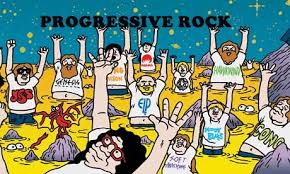
The Rise and Fall of Prog-Rock
By the time rock reached its 15th birthday, things began to get complicated. Teenagers, right?
Having learned to walk with two- and three-chord, some rockers began to push the boundaries of virtuosity, pushing the music closer and closer to the realm of classical composition. Long, multi-movement pieces. Shifting time signatures. Passages that challenged what could be done with the guitar, bass, drums and keyboards lineup.
This was seen as very progressive, hence the tag “progressive rock.” And for a while, this was music for males (almost exclusively males) who prided themselves on understanding the intricacies the genre.
The list of late 60s/early 70s prog-rock bands is endless, some well-known (Yes, King Crimson, Peter Gabriel-era Genesis, ELP, Rush, Pink Floyd, Jethro Tull, etc.), others not so much (Van der Graaf Generator, Gentle Giant, Gong).
But by the mid-70s, some were looking at prog-rock with a sneer. Too complicated! Too self-indulgent! Too hard to learn how to play! Many of those haters became the first to embrace the stripped-down reactionary new thing called “punk.” As progressive as prog-rock was, punk was actually regressive. It reset rock, taking things back to its roots. Outside of a few bands like Pink Floyd and Genesis, prog moved to the margins.
There’s now a new book on prog’s rise and fall. Forbes takes a look:
Between the late 60s and late 70s, the grandiose genre known as progressive or “prog” rock dominated the album charts. Bands like Yes, Emerson Lake and Palmer, and Pink Floyd sold tens of millions of records. A side-long synthesizer epic called “Tubular Bells” by Mike Oldfield stayed on the Billboard charts for 280 weeks, helping to launch Richard Branson’s Virgin empire with the decade’s biggest hit. Then it all vanished faster than a teenager could stash his bong in the closet when he hears his parent’s car in the driveway.
That story is the subject of a new book by Dave Weigel, The Show That Never Ends: The Rise and Fall of Prog Rock just out from W. W. Norton. The book not only makes a strong aesthetic claim for the music and the artists who created it but tells a story of interest to both fans and readers interested in the business of popular culture.



Profs still huge. Lots of new bands.
Definitely. But not as huge as it was in the early 70s.